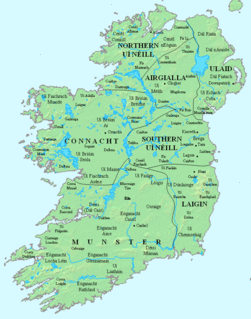| Muirgheas | |
|---|---|
Muirgheas in a Gaelic type, note the lenited g in the name (gh) once appeared in Irish orthography with a dot above it, as pictured. | |
| Gender | Masculine |
| Language(s) | Irish |
| Origin | |
| Language(s) | Irish |
| Derivation | muir + gus |
| Meaning | "sea" + "choice" |
| Other names | |
| Anglicisation(s) | Maurice |
| See also | Muiris |
Muirgheas is a masculine given name in the Irish language. The name is composed of two elements: the first, muir, means "sea"; the second element, gus, means "choice". The name has been Anglicised to the etymologically unrelated Maurice . A contracted form of the name is Muiris (which is also a form of Maurice in Irish). [1]

A given name is a part of a person's personal name. It identifies a person, and differentiates that person from the other members of a group who have a common surname. The term given name refers to the fact that the name usually is bestowed upon a person, normally to a child by their parents at or close to the time of birth. A Christian name, a first name which historically was given at baptism, is now also typically given by the parents at birth.

Irish is a member of the Goidelic (Gaelic) language branch of the Celtic languages originating in Ireland and historically spoken by the Irish people. Irish is spoken as a first language in substantial areas of counties Galway, Kerry, Cork and Donegal, smaller areas of Waterford, Mayo and Meath, and a few other locations, and as a second language by a larger group of non-habitual speakers across the country.

